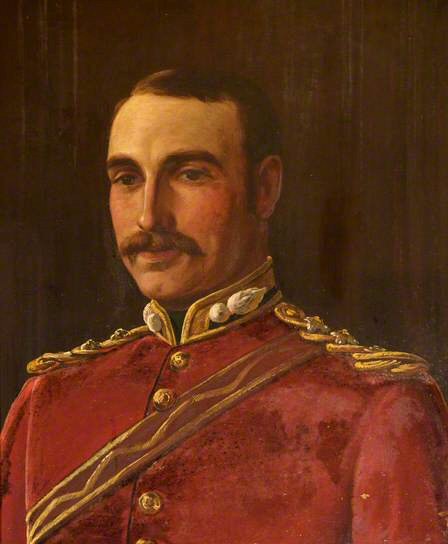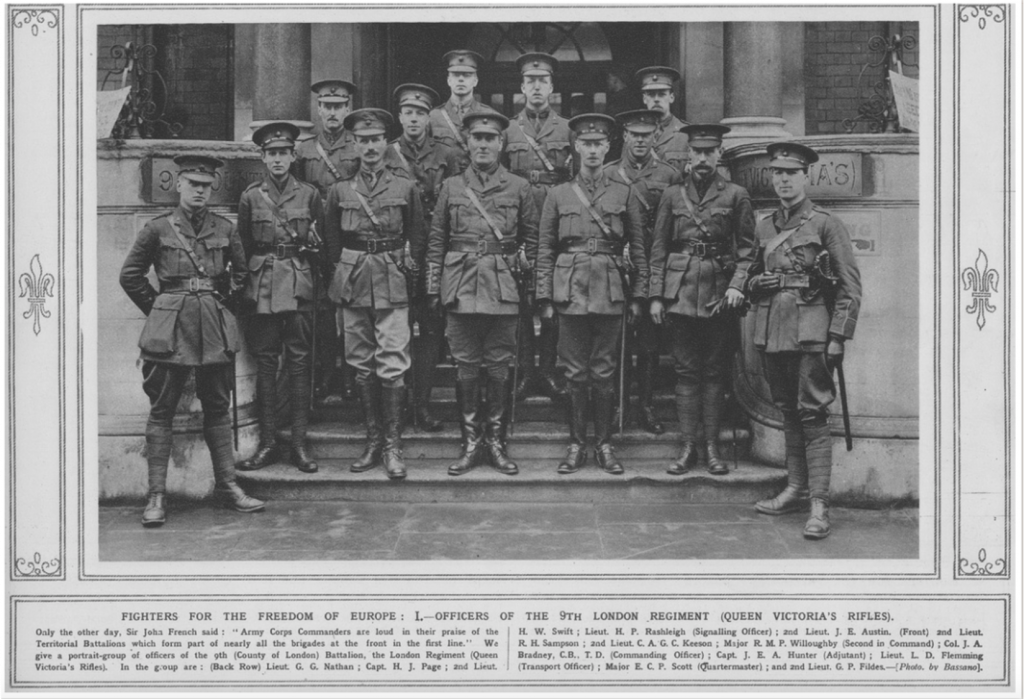
Photo credit: The Regimental Museum of The Royal Welsh
Colonel Sir Joseph Alfred Bradney CB was descended from distinguished Marches family. He was the son and heir of Joseph Christopher Bradney, clerk, of Sutton Court, near Hereford and born 11 January 1859 at Greete in Shropshire. He married first Florence Prothero and later Rosa Jenkins. He had a son Walter who died in the Great War, and a daughter Nest, who married Lt Christopher Robert Berkeley of the Royal Welch.
He went to Harrow before going up to Trinity Cambridge in May 1877.
He was commissioned as into the Royal Monmouth Engineers 1882-92 before being appointed Lt Col Commanding the 2nd Battalion of the Monmouthshire Regiment for the next twenty years. He was made a CB in 1911 and given the TD in 1912.
During the Great War he returned to the Colours and trained and commanded the 9th (Reserve) Battalion, The London Regiment (Queen Victoria’s Rifles) and later commanded the 28th Labour Group in France and Belgium.
In the photograph below he is shown with his Battalion Officers, including fellow lodge members Capt Richard Sampson, 2nd Lt Cuthbert AGC Keeson (also a future CO of the Battalion) his Quartermaster Major Scott and his Adjutant Capt James EA Hunter, as well as Lt Fleming. For more information on the photograph click here.

He was made DL for the counties of Monmouth and Radnor, High Sheriff of Monmouthshire (1889), a JP for Monmouth and Radnor and elected a member of the Monmouthsire County Council. He was also Vice-Lieutenant for Radnor in 1932.
He was an accomplished poet, and in 1919 published a volume of latin poems written during the Great War under the title “Nights in Flanders”.
He was Knighted in 1924 and was a Commander of the Order of St John of Jerusalem.
His other interests included being a member of the Royal Commission on Ancient Monuments in Wales, Governor of the National Library of Wales and the National Museum. He was also a distinguished archaeologist and issued a series of parochial registers, including that of Grosmont, the ancient township in Monmouthshire, and Caerwent, the Roman city. He also published Llandaff Records, edited the Llyfr Baglan and Walter Powell’s Diary.
He most notable work was the six volume “A History of Monmouthshire from the Coming of the Normans into Wales down to the Present Time“
He joined the Lodge on 31 March 1915, having been initiated into the Loyal Monmouth Lodge No 457. He was a regular attendee he never took office and was never installed in the Chair.
He died on 21 July 1933.
Bradney’s youngest son Walter, was killed at Peronne during the German Spring Offensive in early 1918. Sir Joseph’s younger brother John Harford Bradney was a Captain and later Major in the Welsh Guards and served during and survived the War.
There is a discrepancy in the Lodge records that record his middle name as Alexander rather than Alfred.